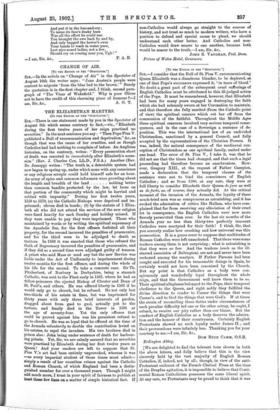THE ELIZABETHAN MARTYRS.
[To THE EDITOR OP THE "SPECTATOR." j SIR,—There is one statement made by you in the Spectator of August 9th which seems contrary to fact,—viz., "Elizabeth
during the first twelve years of her reign practised no severities." In the next sentence you say " Then Pope Pius V. published a Bull of excommunication and deprivation," &c., as
though that was the cause of her cruelties, and as though Catholics had bad nothing to complain of before. An Anglican historian, on the contrary, writes : " Every persecution short of death was resorted to immediately after Elizabeth's acces- sion" (Rev. J. Charles Cox, LL.D., F.S.A.) Another (Rev. Dr. Jessopp) writes : "The truth is, a detestable system had now begun to spring up, under which none with any conscience or any religious scruple could hold himself safe for an hour. An army of spies and common informers were prowling about the length and breadth of the land nothing better than common bandits protected by the law, let loose on that portion of the community which might be harried and robbed with impunity." During her first twelve years, 1558 to 1570, (a) the Catholic Bishops were deprived and im- prisoned; eleven died in bonds; (b) by the statute of 1 Eliza- beth all who did not attend the services of the new religion were fined heavily for each Sunday and holiday missed. If they were unable to pay they were imprisoned. Those who maintained by words or by writing the spiritual supremacy of the Apostolic See, for the first offence forfeited all their property, for the second incurred the penalties of praemunire, and for the third were to be adjudged to death as traitors. In 1563 it was enacted that those who refused the Oath of Supremacy incurred the penalties of praemunire, and if they did so a second time were adjudged guilty of treason. A priest who said Mass or used any but the new Service was liable under the Act of Uniformity to imprisonment during twelve months for the first offence, and during the whole of his life for the second. To take a concrete case. Sir Th. Fitzherbert, of Norbury in Derbyshire, being a staunch Catholic, was sent to the Fleet early in 1561, where he had as fellow-prisoners the ejected Bishop of Chester and Dean of St. Paul's, and others. He was offered liberty in 1563 if be would only go to church, but he refused. He not only lost two-thirds of his estate in fines, but was imprisoned for thirty years with only three brief intervals of pardon, dragged about from gaol to gaol, actually put to the torture, and finally died in the Tower in 1591 at the age of seventy-four. Yet the only offence that could be proved against him was his persistent refusal to go to church. He was so loyal that he offered at the time of the Armada voluntarily to double the contribution levied on his estates, to repel the invaders. His two brothers died in prison also: John being under sentence of death for harbour- ing priests. Yet, Sir, we are calmly assured that no severities were practised by Elizabeth during her first twelve years as Queen! And your readers are left to suppose that St. Pius V.'s act had been entirely unprovoked, whereas it was —as every impartial student of those times must admit— simply a result of her countless crimes against the Catholic and Roman Church, of which England had been a distin- guished member for over a thousand years. Though I might add much more, I trust in your spirit of fairness to publish at least these few lines on a matter of simple historical fact. If non-Catholics would always go straight to the sources of history, and not trust so much to modern writers, who have a position to defend and special cause to plead, we should understand each other better. And Catholics and non- Catholics would draw nearer to one another, because both would be nearer to the truth.—I am, Sir, &c.,






































 Previous page
Previous page